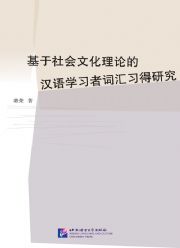Online Bookstore
A Sociocultural Study on the Acquisition of Chinese Vocabulary
Author:Jiang Rong
- Medium:Books
- ISBN: 9787561935187
- Page Count: 133
- Size:
- Pub Date:2013-05
- The book weight: 245 g
- Annotation Language:
- Course:
- Target Audience(Age):
- Target Audience(Language):
- Price:
-
Category: Teacher Development >Educational Theories
Teacher Development >Professional Knowledge
Academic Research
- The product sample: 目录、摘要 Contents & Abstract













